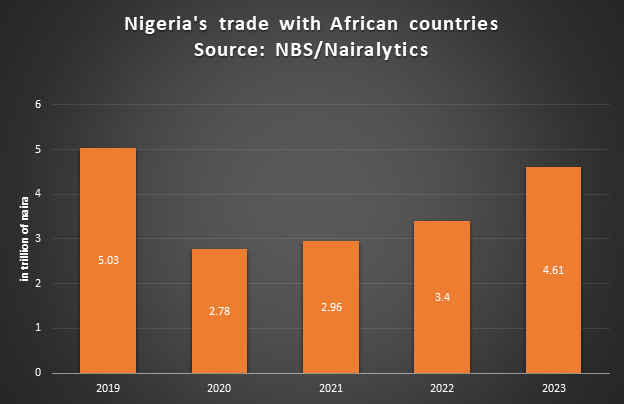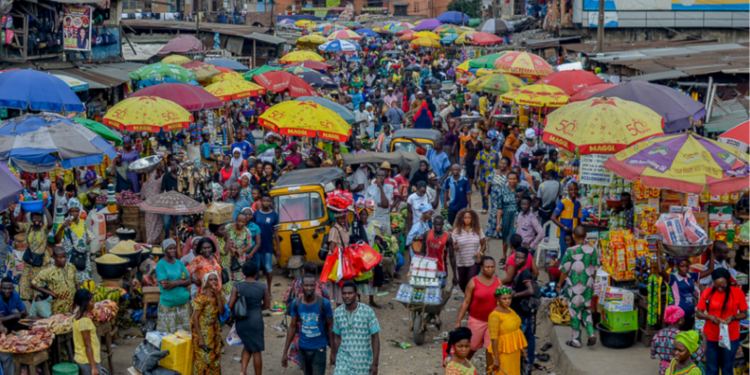Nigeria’s trade with African countries yet to reach pre-COVID-19 levels despite AfCFTA
“African countries need to move quickly to iron out whatever agreements and impediments are remaining to ensure free and smooth trade. Issues around rules of origin negotiations must be completed.”
Nigeria’s trade with African countries has yet to reach pre-COVID-19 levels despite implementing the African Continental Free Trade Area (AfCFTA) agreement in 2021.
Data from the latest foreign trade report of the National Bureau of Statistics (NBS) reveals a slow recovery in Nigeria’s trade with other African nations.
Although there has been a progressive trend from the pandemic slump, the trade volumes have yet to eclipse the pre-COVID-19 zenith, casting a shadow on the effectiveness of the AfCFTA agreement in catalysing a robust trade recovery.
2019 figure outpaces that of 2023 by N420 billion

A breakdown analysis shows that in 2019, the import trade figure was N1.11 trillion, while exports soared at N3.92 trillion, cumulating a total trade of N5.03 trillion.
This period represents a high-water mark for Nigerian trade within the continent, according to data presented by the NBS.
However, the advent of 2020 and the ensuing global pandemic inflicted a pronounced disruption, manifested by a steep contraction in trade. Import values plummeted to N406.88 billion—a stark contrast to the previous year.
While less affected, exports still declined to N2.37 trillion, bringing the total trade down to N2.78 trillion, signalling a retreat in economic interactions and a disruption of supply chains across the continent.
The subsequent year, 2021, marked the beginning of a rebound, albeit a measured one. Imports increased to N551.31 billion, and exports also saw a modest resurgence to N2.41 trillion.
The total trade ascended to N2.96 trillion a recovery in motion but with considerable ground yet to cover.
Continuing the upward trend, 2022’s imports climbed to N738.26 billion and exports to N2.66 trillion, elevating the total trade to N3.4 trillion. The trajectory pointed to a gradual restoration of trade stability.
The latest figures from 2023 show growth, with imports at N896.05 billion and exports at N3.71 trillion, lifting the total trade to N4.61 trillion.
This growth, while noteworthy, is juxtaposed against the 2019 baseline to reveal a still incomplete recovery of about N420 billion.
While Nigeria’s 2023 exports inched closer to the figure in 2019, the imports have yet to catch up, likely due to the country’s foreign exchange crisis.
ECOWAS accounts for 52% of Nigeria’s 2023 trade with African countries
Further analysis shows that countries under the Economic Community of West African States (ECOWAS) account for 52% of Nigeria’s trade with African countries in 2023. Nigeria’s total trade with ECOWAS countries in 2023 was N2.41 trillion, which is close to the N2.46 trillion recorded in 2019.
The data further shows that while Nigeria has neared its pre-COVID-19 export levels to ECOWAS countries at nearly N2.24 trillion, it is yet to meet up with its import levels by about N47.51 billion. While it imported N215.79 billion in 2019 from ECOWAS countries, it imported about N168.28 billion by 2023.
Reasons for Slow Recovery
- An Economic Commission for Africa (ECA) report revealed that Africa’s contribution to global trade remains at less than 3%. The report noted that African nations still engage in more trade with countries outside the continent than with each other. The report further noted that although the agreement establishing the AfCFTA officially started on January 1, 2021, the anticipated improvements in trade between African countries have not materialised.
- Almost a year ago, ECA also noted that factors such as a lack of awareness of the protocol, political will, and security concerns hampered AfCFTA’s full implementation.
- Challenges identified by the Manufacturers Association of Nigeria (MAN) include epileptic power supply, insecurity, inadequate infrastructure, shortage of foreign exchange and naira depreciation.
More Insights
The Chairman of the Board of Directors and Advisory Board at the Africa Private Sector Summit, Professor Kingsley Moghalu, recently said that when fully implemented, the AfCFTA is expected to boost intra-African trade by 52%, lift 30 million people out of poverty, and increase the continent’s GDP by $450 billion by 2035.
Also, Silver Ojakol, Chief of Staff of the AfCFTA Secretariat, during the 2023 Regional Integration Issues Forum in Accra, Ghana, noted that through the AfCFTA, African countries can generate over $70 billion in trade activities.
Speaking on the potential of the AfCFTA, Vice President Kashim Shettima recently said:“African trade is to be boosted by 52.3% by 2025. We should increase these targets and look at the trillions of dollars.
“African countries need to move quickly to iron out whatever agreements and impediments are remaining to ensure free and smooth trade. Issues around rules of origin negotiations must be completed.”
The operationalisation of AfCFTA, which is projected to be a game-changer in enhancing intra-African trade, seems to have not yet reached its full potential in bolstering Nigeria’s trade figures beyond the pre-pandemic levels.
The expected economic integration and creation of a unified market that AfCFTA envisions appears to be a work in progress.
This calls for a deeper introspection into the trade facilitation mechanisms under AfCFTA, a closer examination of Nigeria’s trade policies, and an aggressive push towards infrastructural and policy reforms that can truly leverage the single continental market.
Source:norvanreports


